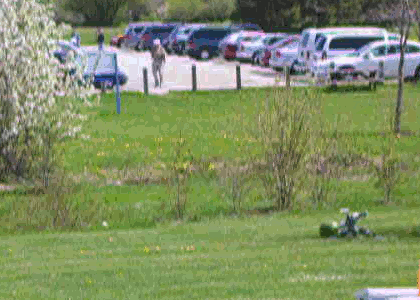So I wanted to comment on some current examples where critical thinking helps.
Greenwash
The term "Greenwash" has been around for about 20 years but has only recently made it into the mainstream. Basically, Greenwashing is about companies exaggerating and overstating their environmental contribution. An advertising con-job carried out on the public. Often where companies spend more advertising their greenness than actually contributing to the environment.
- For a history and definition see Wikipedia, here.
- For a consumer index, see the Greenwashing Index, here.
Update: I saw a related survey on "What should we do about bogus ‘green’ technologies?" at another Scouters blog.
Security Theatre
The term "Security Theatre isn't as mainstream yet. It refers to security measures that give people the illusion of security rather than providing real and measurable security. A lot of the security measures put in place since 9/11 fall into this category.
Examples of this include no-fly-lists. While they seem like a good idea at first glance, they break down under scrutiny. The problem with the list is that it isn't properly maintained; it is subject to false alarms - it has been used to detain babies, children, well known public figures, politicians, sky-marshalls, and inconvenience many thousands of people; there is no visible oversight of its effectiveness; known terrorist suspects have been kept off it; and there is no evidence to support that it has ever stopped an attack. I won't get into more detail on this debate, but if you're interested you can find more by one of the leading critics of Security Theatre, Bruce Schneier, who has posted many articles on his widely read blog. A few are below:
- The No-Fly List
- Five-Year-Old Boy Detained by the TSA
- Sky Marshals on the No-Fly List
- No-Fly List to Be Scrubbed (cleaned up)
- Canadian Privacy Commissioner Comments on the No-Fly List
- In Praise of Security Theater
- The Chaser, an Australian team has made fun of this with such episodes as "Airport Security" and the "Trojan Horse". Video clips are available on You-Tube here and here.
- The TV series "Boston Legal" dedicated part of an episode to the absurdities of the no-fly list. An audio clip can be found here (mild language warning).
The world is full of doomsday prophecies and other bunk. A healthy does of skepticism is useful for dealing with extraordinary claims. There are lots of people who will waste your time seeking attention, money, and fame. All of this they take from you without providing anything of value back.
Current examples include:
- The end of the Mayan calendar in 2012 predicts the end of civilization. This is no more true than suggesting the earth would end after December 31st, 999AD or 9999AD - the calendar is just a bit stranger. See here and here.
- Planet X is coming to destroy us. Planet X was originally an astronomical reference to a presumed missing planet or unknown planet beyond Neptune. Pluto didn't fit the bill and it took over 50 years to resolve the facts. Later the name was usurped by conspiracy theorists. The predictions aren't supported by facts and the date for doomsday has been revised. See articles, here, here and a series of articles here.
Some bunk that has passed their best before dates:
- Venus Transit (in 2004) Floods
- The Grand Alignment of Planets Disasters (2000 and many previous years)
- Asteroid 2007 TU24 near miss disasters. For a description of this rock see Wikipedia. For the debunking see this and this. For a told-ya-so, see this.
- Planet X (2003).
Wanting to believe
People are often predisposed to believe in a cause. The problem with this is that people often suspend their critical thinking and can be taken in. They can overreact to circumstances. Or they can mis-evaluate the situation.
To demonstrate this, a group took a petition to an environmental event. The petitioners (correctly) claimed that there was a substance associated with all major sources of water pollution and sought a ban on the chemical. What was it? Check out dhmo.org for a wealth of information of dihydrogen monoxide (dHmO, aka H2O). Sadly, a large number of people just listened to the spin and signed the petition to ban water!
While there is nothing wrong with wanting to believe or belong, we still need to be careful to apply some critical thinking.









